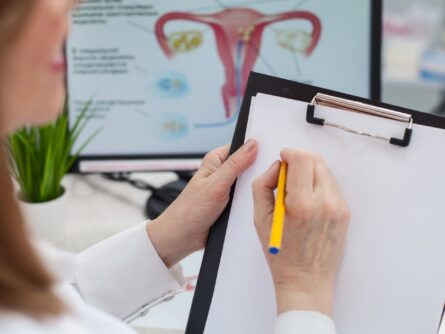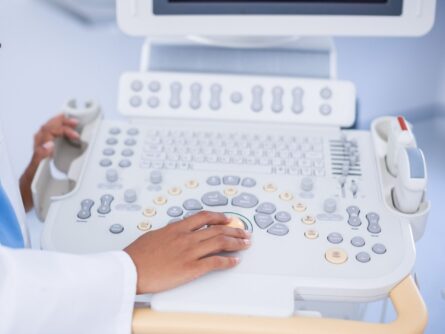What is the High Complexity Case Unit?
At our specialised unit for Implantation Failure and Recurrent Miscarriage we are dedicated to finding solutions to complex cases involving previous failed cycles, rare pathologies and undiagnosed cases (“unexplained infertility”) which have resulted in undesired outcomes.
The medical team who will treat you is specialised in these types of cases and is exclusively dedicated to offering a unique solution to your particular case.

Stages of the Process
Case Study
Diagnosis
Treatment approach from a multidisciplinary point-of-view
Who are High Complexity Case Consultations intended for?
Implantation Failure
Patients who have transferred a minimum of 4 good quality embryos over the course of at least 3 embryo transfers, with at least one being the transfer of a blastocyst embryo.
Recurrent Miscarriage
Patients who have had 3 consecutive miscarriages or who have been diagnosed with a condition following the second miscarriage.
Unexplained Infertility
Patients whose infertility has no known cause after having already undergone the Basic Fertility Study.
Request a Case Study
Private 45 minute Skype Consultation.
Request your appointment
Specific studies ordered in cases of Implantation Failure and Recurrent Miscarriage

Immune Studies
The tests and analyses ordered for the immune study are:
- Endometrial NK cell study.
- Autoantibody and serum immunoglobulin abnormalities.
- Cytokines and Interleukins related to the lymphocyte response (Th1/Th2 ratio).
- Study of the Complement System.
- Study of maternal/embryo compatibility via maternal KIR genotype and paternal HLA-C haplotype.

Non-Immune Studies
The tests and analyses ordered for the non immune study include the remaining causes (genetic, haematology, endocrine, uterine anatomy, etc.) which could have an impact on implantation or cause early miscarriage:
- Thrombophilia study.
- Alterations in the coagulation cascade.
- Coagulation factor mutations.
- Uterine contractility study.

Endometrial Studies
These studies involve taking a sample of endometrial tissue to improve receptivity or to carry out further testing such as:
- Endometrial cultures.
- Study of endometrial NK cells.
- Study of plasma cells.
- Study of anatomic pathology.
- Endometrial synchronisation test (ER Map/ERA).
Frequently asked questions about implantation failure and recurrent miscarriage
We often have good quality, healthy embryos, but in spite of this we are unable to obtain a viable pregnancy (cases of repeated implantation failure), or we achieve a pregnancy but it does not progress correctly (cases of recurrent miscarriage). Although it’s not always the case, there are often underlying immune issues which prevent the mother from accepting the embryo.
Immunology is one of the essential physiological pillars to achieving a pregnancy, as the success of a pregnancy depends on correct immune balance.
Pregnancy is a challenge and an immunological paradox for the mother, as her immune system must allow a semi allogeneic embryo to implant (an embryo that shares 50% of her genetic material), or even an allogeneic embryo to implant (100% of the embryo’s genetic material is different from the mother’s). According to the laws of transplant immunology, the mother should reject the embryo because its genetic material is different from her own. However, embryo implantation is tolerated under normal circumstances.
The necessary immune tolerance processes which prevent the mother from rejecting the embryo are extremely complex, and at present we do not even understand all the mechanisms which allow for normal implantation and development of an embryo inside the mother’s womb.
Immune system tolerance or rejection conditions implantation. In reproductive immunology we strive to pinpoint the factors involved in the early stages of pregnancy so that we can adjust them, as necessary, to offer personalised solutions on a case-by-case basis.
When we study conception and pregnancy failure we should keep the following in mind:
- Genetic abnormalities. Genetic and chromosome abnormalities are responsible for 50% of pregnancy losses and are also the most common cause of recurrent miscarriage.
- Abnormal uterine anatomy. According to some experts, as many as 15% of cases of recurrent miscarriage occur due to uterine malformations. The most common malformation is uterine septum in which the uterine cavity is divided in two by a central band.
- Thrombophilia. Blood coagulation disorders, whether they are inherited or acquired, occur in around 3-4% of cases and lead to coagulation abnormalities in the mother’s blood which prevent the placenta from forming or the fetus from properly developing.
- Immune causes. Immune issues occur due to abnormalities in the mother’s immune system which cause an abnormal response during pregnancy: the mother’s body attacks the fetus because it believes it is protecting itself from a foreign object.
- Endocrine causes. Only uncontrolled endocrine disorders could pose a problem, as disorders that are being treated shouldn’t have any significant impact on pregnancy loss.
Several types of immune cells have been identified at the maternal-fetal interface, including Uterine Natural Killer cells (uNK) (70%), macrophages (20%), T lymphocytes (10%), dendritic cells and B lymphocytes (very few). The number of cells present and the role they play change throughout the different stages of pregnancy.
NK cells are the lymphocytes which have the greatest impact on maternal-fetal tolerance. NK cell function is regulated by a series of receptors that produce different signals. Among the NK cell receptors identified is a family of receptors similar to immunoglobulin (KIR); these receptors bind to proteins such as HLA-C (C-class histocompatibility antigens).
HLA is one of the identification systems the body uses to recognise its own material and to protect itself from foreign materials. Both KIRs and HLA-C are polymorphic and certain combinations could negatively impact the success of a pregnancy. Several promising lines of research are investigating the very likely impact of HLA-G, HLADQ and E systems on achieving a pregnancy.
- Pro-inflammatory states which would result in the imbalance of implantation tolerance mechanisms (Th1/Th2).
- Unbalanced proportions of permissive and cytotoxic NK cells (CD56, CD16, CD69).
- HLA/KIR combinations which easily trigger immune rejection.
- Imbalances in regulation factors which control or act as mediators in the immune process.
- Systemic diseases which have a direct impact on immune control.
- Psychological situations with acute stress that have a direct impact on immune system control.
Although this is a new field in reproductive medicine, we are seeing a growing number of studies, treatments and improved results, thus making it possible for most people to have a child.
